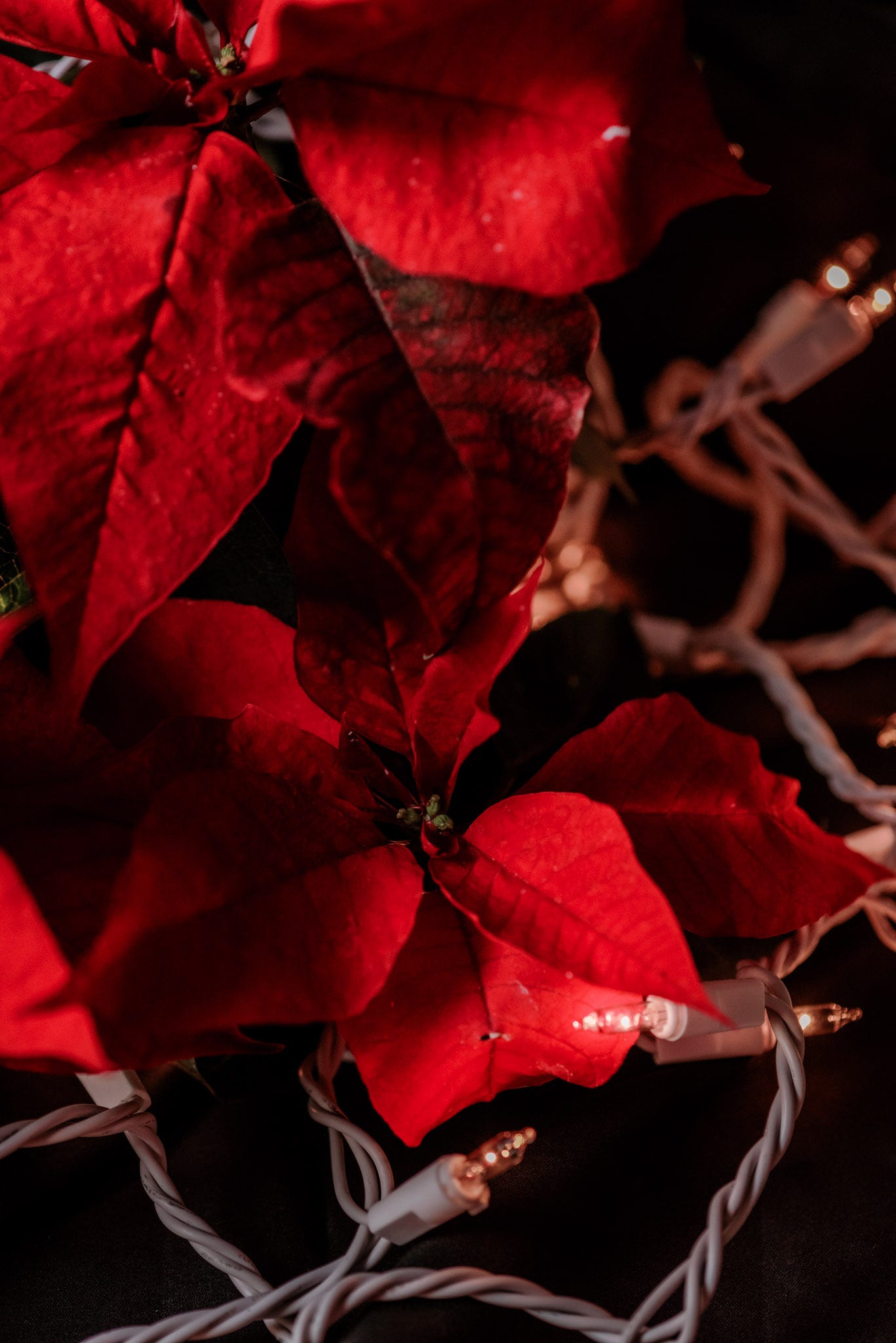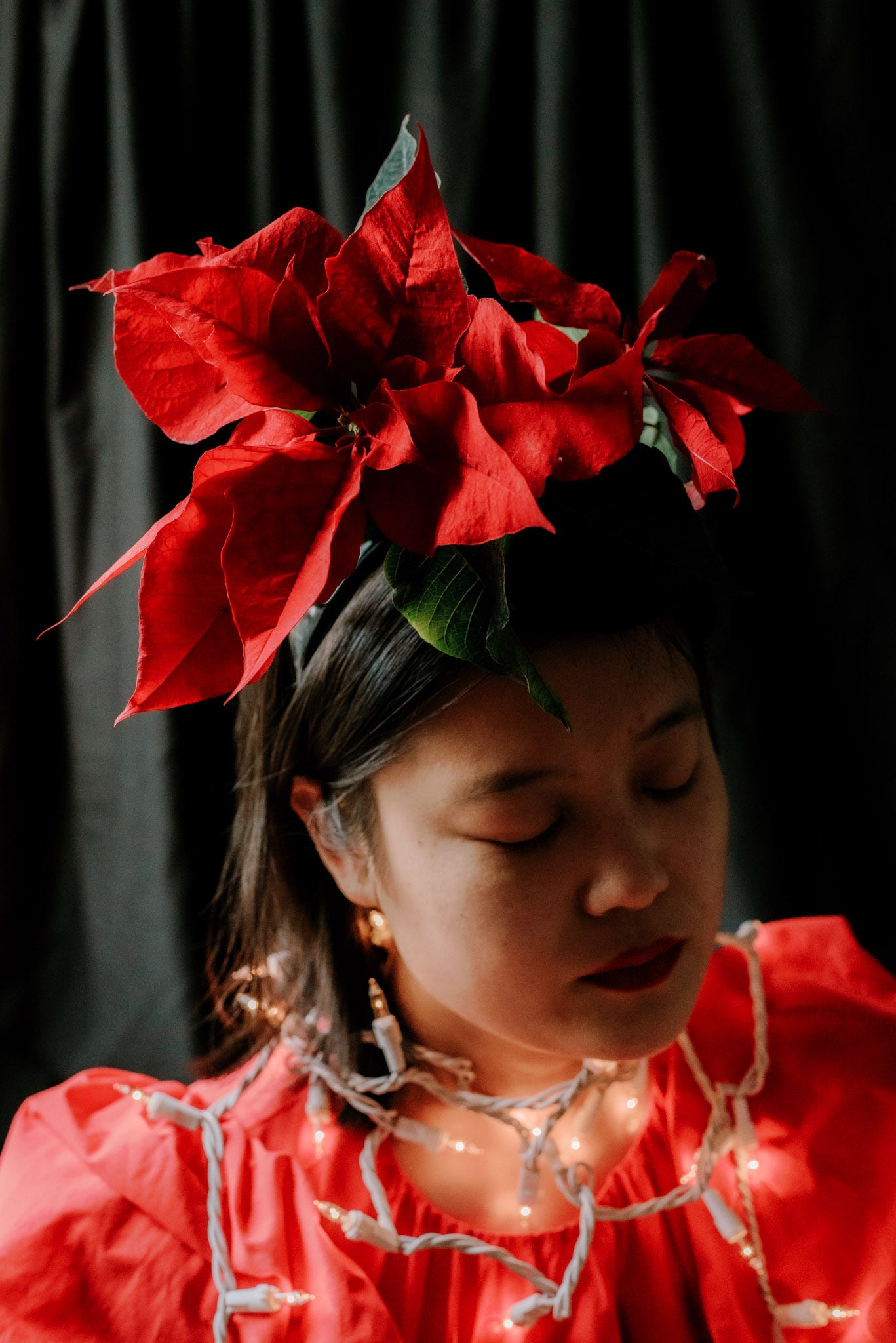Just Another Pretty Face
Exploring and lamenting the commercialization of being.
Starting in September 2022, I began a year-long floral self-portrait series to document my first year in New York. This is the December entry, “Just Another Pretty Face.”
“You’re so beautiful,” the delivery man said as he handed me the package. He had walked up the stairs because he figured I “wouldn’t want to come down.” The line that had me tickled with human goodness was followed by the brash declaration that then twisted my stomach into a pretty bow of displeasure. I closed the door as fast as I could, squeaking out a “thank you” that was more politeness and perhaps training than it was an expression of gratitude.
This year I turned 25, and since then I have spent a pathetic amount of time pondering my societal value. Said value is chiefly measured, in my experience and opinion, in looks and economic output. Late into the night, I lie awake awash in guilt—but not regret—for taking a gap year after university. Every morning, as I slather my face with skincare products (which I would have never considered using five years ago), I eat my words, which told a friend in her 70s not to worry about her wrinkles. Because here I was, at one-third her age, worrying now about mine. Ah, the blind optimism of being a youthful 23.
I have never considered myself pretty nor beautiful nor any other adjective that one would use to describe attractiveness. This is, in part, why the delivery man’s words bristled me so. (That, and perhaps being conditioned by the patriarchy to somehow internalize that my value comes from my looks.)
I will never, obviously, fit the Western beauty standard. It is only recently, maybe in the last five years, that I have come to accept my body and my face for what they are. Society blithely tells us to love our bodies. I have made but a tender truce with mine. It was only this year that, with the intervention of a friend, I have stopped the practice of intermittently starving myself in the milquetoast mindset that perhaps by being skinnier I would compensate for lack of “beauty”—whatever that means today.
And so I bristle at the idea that anyone would ever call me beautiful. Aren’t they only saying it because they want something from me? They don’t even want to know my name, the things and the people I love. In fact, sometimes it feels like I don’t have a name, that I have no personality; I do not exist but as a singular dimension of someone’s desire. I am simply an object to be admired. That is more unsettling than any creepy serial killer stalking the shadows.
So, I take offense. I spend an inordinate amount of time in the mirror, scrutinizing the gentle lines that will eventually manifest as wrinkles, taunting me with the knowledge that I am damned to become a slave to youthfulness, even if beauty eludes me, as I run the hamster-wheel race against the depreciation of desirability. Yet even that mythical, tantalizing fountain eludes us still, and so when it fades, I will have no claim to value at all…if I had anything to begin with. Instead of stocking up on compliments about my looks, I have now relished praise that might be directed to my intellect, my creativity…anything that isn’t tied to the ticking time bomb of aging.
That in itself, however, is a double-edge sword. At the other end of the pendulum of “that which is valuable” is our intellect and/or our ability to work. We are cogs in a machine, slaves to a system that is singularly about what you can give and what they can take. When the system decides that you have nothing left to give, loyalty and faithfulness are no object. You are simply a resource to be siphoned and then abandoned like a lonely oil well in a parched wasteland.
This series of self portraits is a critique on how we give value. The body—and even the mind—exist for what feels, at times, solely the commercial value they provide. They love you while you’re beautiful. They want you while you produce “worthwhile” work. I can think of no holiday (and no flower) more commercialized than Christmas and the poinsettia, which seems to appear exclusively during the season and only in stores.
In this series, I am but a body to be dressed, to be admired (or not). The qualities that make me who I am are strangled by capitalism. The only thing that matters is the economic value I produce and the beauty of youth that pleases now, only to wilt, like the flowers, a short time later. When I can no longer be beautiful enough (if there was any beauty to begin with) and when I can no longer keep up with the spokes of capitalism, I will be tossed, yard clippings to the wind.





